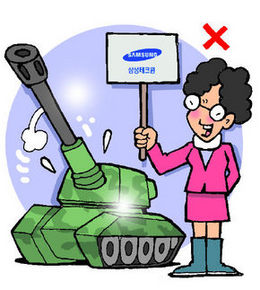Posted on : Dec.20,2006 14:17 KST
Modified on : Dec.20,2006 14:25 KST
Choice becomes not just product, but what its maker stands for
The idea of having a more politically aware, holistic lifestyle seems the polar opposite of consumer culture and the consumption it pushes. But there are some people who attempt to make their life better through so-called politically correct consumption. For these conscientious consumers, just the act of purchasing one item could encourage inappropriate business practices or even threaten global peace if its maker engages in oppressing laborers or producing materials used in war.
Park, who is in his 30s, does not buy coffee from Starbucks because he believes that buying a product from the coffee chain could increase instability in the Middle East. This perception is based on the fact that Howard Shultz, CEO of Starbucks, has made discriminatory remarks against Palestine.
"Though [Israel] has had a tumultuous history, recent developments in the area suggest it is not conscious of peace and human rights," Park said. "I do not drink Starbucks coffee since it could exacerbate sufferings of the people in the Middle East."
Lee Ji-eun, 27, a member of the civic group Imagination for International Solidarity, echoes this view, saying, "Starbucks, a symbol of urban life, is nothing more than a symbol of death to me."
Jo, a 34-year-old civic group activist, has not bought a product manufactured by large companies for the past 10 years. He is afraid that the money paid for a product could end up in the hands of companies which also produce war equipment. Samsung Techwin, for example, produces digital cameras but at the same time manufactures armored vehicles and other weaponry. A Defense Ministry website included such high-profile companies as Doosan Heavy Industries & Construction and Samsung Electronics on a list of those firms engaging in weapons production or related work.
Lee Su-jung, 35, a labor attorney, does not buy clothes made by E-Land. She said that E-Land is one of the nation’s most notorious firms in oppressing labor unions and violating workers’ rights. "I cannot buy clothes made through the sacrifice of workers," she said.
There is no shortage of such cases. In 2002, the James Bond movie Die Another Day came under heavy fire for its distorted portrayal of the two Koreas. The following year, Korean consumers boycotted the coffee products of Nestle for what they called the company’s "profit-oriented" business practices here.
Behind all these phenomena lies a consumer movement that targets not products but the sociopolitical stances of their manufacturers, as a growing number of people are becoming aware of the fact that consumption can carry with it larger ramifications.
Please direct questions or comments to [englishhani@hani.co.kr]









